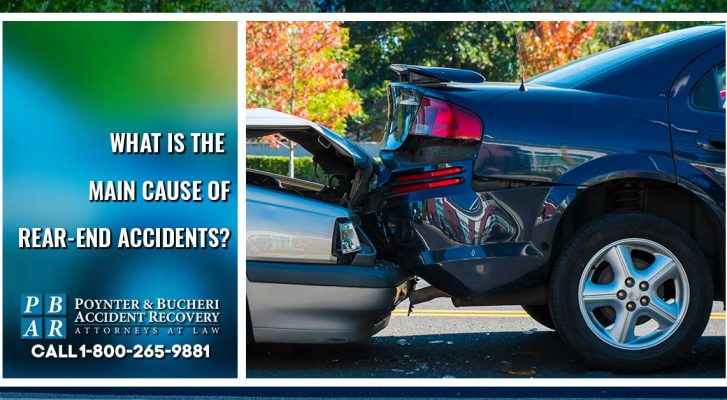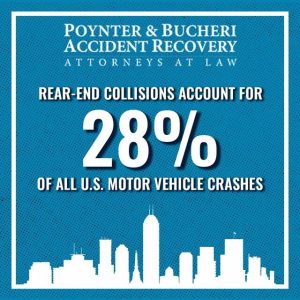
What is the Main Cause of Rear-End Crashes in Indiana?

What you’ll learn from this article:
- The main cause of rear end crashes is human error.
- The two most serious outcomes of a rear-end collision are disabling injuries and traumatic brain injuries.
- With a lawyer’s help, you can claim compensation for your injuries and other losses from an Indiana rear-end crash.

A rear end crash takes place in the blink of an eye and leaves you wondering, “What just happened?” It’s a shocking situation that happens thousands of times every day across the United States.
Rear-end collisions account for 28% of all U.S. motor vehicle crashes and approximately 1.4 million happen every year. About 26% of these car accidents involve significant injuries like whiplash and brain damage, and another 7% are so severe they cause fatalities.
What is the Main Cause of Rear-End Crashes?
The primary cause of rear-end crashes in Indiana and across the U.S. is human error. A Stanford Law School University study found that approximately 90% of all motor vehicle crashes are attributable to driver errors like making bad judgments and improper movements behind the wheel.
More specifically, the main causes of rear-end accidents are distracted driving, drunk driving, following too closely, and abrupt stops. Weather is an additional cause, although it is less common.
Distracted Driving
The moment someone takes their eyes off the road or hands off the wheel, the risk of a rear-end crash rises instantly. Looking away from the road for five seconds at 55 miles per hour is like driving the length of a football field with your eyes closed, according to the National Highway Traffic Safety Administration.
Under Indiana Code 9-21-8-59, also known as the Distracted Driving Law or Hands-Free Driving Law, it’s illegal for drivers to text, email, or message while driving in Indiana. It’s also illegal to text and use the internet while stopped at a traffic light due to the risks of distracted driving and rear-end crashes.
Drunk Driving
More than 30 people die every day due to drunk driving. When someone drives drunk, their reaction time is slower and their inhibitions are lower. They might make irrational and unpredictable decisions that lead to severe rear-end crashes.
Drunk driving can be a misdemeanor or felony in Indiana, depending on the level of intoxication, ages of passengers, previous convictions, and whether someone was injured or killed in the accident. Penalties range from a ticket for a first offense as a minor to 10 or more years in prison for a repeat offender who kills someone while driving drunk.
Following Too Closely
Although tailgating might not seem like a big deal, it’s a common cause of rear-end crashes. Following another vehicle too closely makes it more likely that you won’t have enough time to stop and will collide with the rear end of their vehicle when traffic stops.
Abrupt Stops
The rear driver isn’t always at fault for a rear-end collision. Sometimes, the front driver is driving aggressively, brake-checking, or making unexpected movements that cause other drivers to brake suddenly despite trying to drive safely.
Weather
After a crash, drivers might blame the accident on weather-related conditions like puddles, storms, and ice. The U.S. Department of Transportation reports that approximately 20% of all road crashes have a weather related-component, although the conditions may or may not be the primary cause of the accident.
What are the Two Most Serious Outcomes of a Rear-End Collision?
Other than fatalities, the most serious outcomes of rear-end collisions are disabling injuries and traumatic brain injuries (TBIs). TBIs range in severity from mild concussions to permanent brain damage. Some brain injuries are focal, or confined to one section of the brain, and others are diffuse, which means they have widespread impact and can affect numerous bodily organs and systems.
Symptoms of TBIs include worsening headaches that won’t go away, weakness, numbness, fatigue, fainting, dilated eyes, confusion, crying or emotional dysregulation, lack of mental or physical coordination, and trouble with normal body functions like seeing, speaking, and walking. A brain injury should always be evaluated by a qualified medical professional.
Whiplash is another serious car accident outcome that is sometimes taken too lightly. Whiplash is the term for an injury where the neck snaps back and forth quickly, which commonly occurs in rear-end accidents.
Although whiplash happens suddenly, symptoms tend to build gradually and take a long time to heal. Common whiplash symptoms include neck pain, stiffness, dizziness, numbness, ringing in the ears, blurry vision, irritability, and sleeplessness.
See a doctor immediately after a rear-end crash, even if you don’t have identifiable symptoms right away. Indiana car accident attorneys work with injured clients who have a wide range of rear-end crash injuries, including:
- Back injuries and ongoing back pain
- Fractures in the feet, hands, neck, and more
- Head injuries of all types
- Internal bleeding and organ damage
- Knee injuries
- Nerve damage and pain
- Scars, disfigurement, and permanent impairment
- Shoulder injuries
- Traumatic brain injuries
- Whiplash
Poynter & Bucheri Accident Recovery – Indianapolis Accident Attorneys
After a rear-end crash, contact the Indiana accident recovery attorneys at Poynter & Bucheri. We have the experience you need to pursue full and fair compensation. You may be entitled to a significant award for your medical bills, lost wages, pain and suffering, and more. Contact Poynter & Bucheri Accident Recovery at 1-800-265-9881 now for a free rear-end accident case review. Don’t hesitate. One of our attorneys can assist you right away
